De Nederlandse dichter, schrijver en columnist Cees van der Pluijm werd geboren op 12 januari 1954 te Radio Kootwijk (Gld.). Zie ook alle tags voor Cees van der Pluijm op dit blog.
Winterpark
Je ademt witte wolken uit
Het park spreidt als een winterbruid
Nog blinkend, haast onaangeraakt
Een wereld van gedempt geluid
Waarin je voetstap knisperkraakt
Waarin je kinderziel ontwaakt
Je weet dat het niet duren zal:
(Als al het ongerepte schoons)
Straks vliedt als water naar het dal
Wat uit de lucht viel als kristal
De wereld kreeg iets ongewoons
De vaders werden weer als zoons
Dit moest de sneeuw zijn van hun jeugd
O winterpark, o kindervreugd…
De cederallee
Zo moet het zijn: het tedere geweld
Van ceders in september, kopergroen
Als wachters in gelid, die heel het bos
Behoeden voor wat schuilt en spiedt en dreigt
Maar beuken zijn het: neigend naar het veld
En reikend naar de lucht, een legioen
Van overmoed dat zonder blik of blos
Ons voorhoudt dat het eeuwen overstijgt
En in oktobers late middagzon
Valt stofgoud van de droge bladerdos
November waait de eerste takken los
Het leven wijkt nu met de lichtval mee
Dan wordt voltooid wat eens als feest begon
Verloochend in een herfstige allee
Uit: Momenten
1957
Vijfhonderd meter was het hemelsbreed
Een handkar was voldoende voor het huisraad
En jij mocht zittend mee, wat zat je plat
Fijn bonkend op de bodem met je gat
Een kind van drie dat naar een ander huis gaat
En de gemeentegrens zelfs overschreed
’t Was net iets groter; ’t lag er bijna naast
’t Was meer verplaatsen dan verhuizen haast
Maar Barneveld werd Apeldoorn die zomer
Je weet nog dat het warm was: almaar lomer
Werd ieder ritje hotsend uitgezeten
Ook wees men naar de hemel, stomverbaasd
Om wat je later nooit meer zou vergeten:
Zo’n Sputnik was wel kostje voor een dromer…
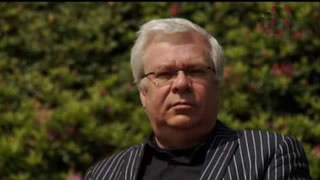
Cees van der Pluijm (12 januari 1954 – 14 december 2014)
De Britse schrijver David Mitchell werd geboren in Southport op 12 januari 1969. Zie ook alle tags voor David Mitchell op dit blog.
Uit: The Bone Clocks
“Well, perhaps your little walk took you up Peacock Street, to a certain someone called Vincent Costello?” The kitchen sort of swirls, and through the window, on the Essex shore of the river, a tiny stick-man’s lifting his bike off the ferry. “Lost for words all of a sudden? Let me jog your memory: ten o’clock last night, closing the blinds, front window, wearing a T-shirt and not a lot else.”
Yes, I did go downstairs to get Vinny a lager. Yes, I did lower the blind in the front room. Yes, someone did walk by. Relax, I’d told myself. What’s the chances of one stranger recognizing me? Mam’s expecting me to crumple, but I don’t. “You’re wasted as a barmaid, Mam. You ought to be handling supergrasses for MI5.”
Mam gives me the Kath Sykes Filthy Glare. “How old is he?”
Now I fold my arms. “None of your business.”
Mam’s eyes go slitty. “Twenty-four, apparently.”
“If you already know, why’re you asking?”
“Because a twenty-four-year-old man interfering with a fifteen-year-old schoolgirl is illegal. He could go to prison.”
“I’ll be sixteen in September, and I reckon the Kent police have bigger fish to fry. I’m old enough to make up my own mind about my relationships.”
Mam lights one of her Marlboro Reds. I’d kill for one. “When I tell your father, he’ll flay this Costello fella alive.”
Sure, Dad has to persuade piss-artists off the premises from time to time, all landlords do, but he’s not the flaying-anyone-alive type. “Brendan was fifteen when he was going out with Mandy Fry, and if you think they were just holding hands on the swings, they weren’t. Don’t recall him getting the ‘You could go to prison’ treatment.”
She spells it out like I’m a moron: “It’s—different—for—boys.”

David Mitchell (Southport, 12 januari 1969)
De Nederlandse dichter en schrijver Jacques Hamelink werd geboren op 12 januari 1939 in Driewegen, bij Terneuzen. Zie ook alle tags voor Jacques Hamelink op dit blog.
Proefpatroon
In de rietlaagte waar kapotte petroleumstellen eindigen
hebben boerenturven de beige koffers ammunitie uitgekipt.
Licht vastgezogen in de eendemodder en amper onder water
lokken, half doorgeroest, de diverse soorten belemnieten er.
In het geheim aan de schaafbank wrijf ik schoon wat ik kan. Zet
in de bankschroef puntvast de scherpe patroon, slaghoedje boven.
Hamertje-tik geeft de vlam in de pan, helse oorpijn. Geen hulsflinter
is over, zo waar als ik ongedeerd de dreun van de god geïncasseerd heb.
Baadster
Ze zit op haar hurken overdwars
in de badkuip Evavoorbeeldig
rechtop onder de douchesproeier
die ze als een föhn boven haar
hoofd hanteert, die haar volmaakt,
die haar de bloeddichtbije huid
bekleedt met het continu gruis-
glasscherp verglaasselglanzend
zich vergietend warmwatervlies,
het klaterjuweel dat ze geniet,
met de vrije hand haar haar
achter haar oren vastklevend,
de ogen toe, voor de nacht toilet
makend in de badkuiphurkzit, haar
van het badwater luxurieus gezalfd
schijnende borsten zich zeer groot tonend.
Albaanse grens
De tankkolonne in de zode terzijdegeschoven. De mededood-
groene kolonne met de lanceerinstallaties vordert voorrang.
Over verrotgereden landweg zwermen naar de strijdvehikels
de gehuchtkrijgertjes uit, in frank plezante geestdrift als
hanen kraaiend, opvliegbewegingen makend, om hun iele spil
zich draaiend ter verwelkoming van NATO en hun extase speelt
en het elan van Cantecleer fier op zijn mestvaalt voor elkaar
dat het verbeterd bombardement en de tankslag gelijk aanvangen.
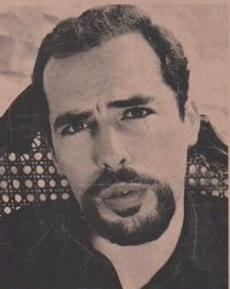
Jacques Hamelink (Terneuzen, 12 januari 1939
De Japanse schrijver en vertaler Haruki Murakami werd geboren op 12 januari 1949 in Kyoto. Zie ook alle tags voor Haruki Murakami op dit blog.
Uit: What I Talk About When I Talk About Running
“I’m on Kauai, in Hawaii, today, Friday, August 5, 2005. It’s unbelievably clear and sunny, not a cloud in the sky. As if the concept clouds doesn’t even exist. I came here at the end of July and, as always, we rented a condo. During the mornings, when it’s cool, I sit at my desk, writing all sorts of things. Like now: I’m writing this, a piece on running that I can pretty much compose as I wish. It’s summer, so naturally it’s hot. Hawaii’s been called the island of eternal summer, but since it’s in the Northern Hemisphere there are, arguably, four seasons of a sort. Summer is somewhat hotter than winter. I spend a lot of time in Cambridge, Massachusetts, and compared to Cambridge—so muggy and hot with all its bricks and concrete it’s like a form of torture—summer in Hawaii is a veritable paradise. No need for an air conditioner here—just leave the window open, and a refreshing breeze blows in. People in Cambridge are always surprised when they hear I’m spending August in Hawaii. “Why would you want to spend summer in a hot place like that?” they invariably ask. But they don’t know what it’s like. How the constant trade winds from the northeast make summers cool. How happy life is here, where we can enjoy lounging around, reading a book in the shade of trees, or, if the notion strikes us, go down, just as we are, for a dip in the inlet.
Since I arrived in Hawaii I’ve run about an hour every day, six days a week. It’s two and a half months now since I resumed my old lifestyle in which, unless it’s totally unavoidable, I run every single day. Today I ran for an hour and ten minutes, listening on my Walkman to two albums by the Lovin’ Spoonful—Daydream and Hums of the Lovin’ Spoonful—which I’d recorded on an MD disc.
Right now I’m aiming at increasing the distance I run, so speed is less of an issue. As long as I can run a certain distance, that’s all I care about. Sometimes I run fast when I feel like it, but if I increase the pace I shorten the amount of time I run, the point being to let the exhilaration I feel at the end of each run carry over to the next day. This is the same sort of tack I find necessary when writing a novel. I stop every day right at the point where I feel I can write more.”

Haruki Murakami (Kioto, 12 januari 1949)
De Nederlandse dichter en schrijver Kamiel Verwer werd op 12 januari 1979 in Tilburg geboren. Zie ook alle tags voor Kamiel Verwer op dit blog.
Humaan
twee transhumanisten uit Leiden
wilden het leed van de mensheid vermijden
ze programmeerden hun brein
en wat hadden ze het fijn
tot ze zich van het silicium wilden bevrijden
Kwamrij
je bleef een dapper en verliefd estheet
die scherp en galant zijn kruit verschoot
je bracht leven in de bliksemse keet
Gerrit, waarom verdomme ben je nu al dood

Kamiel Verwer (Tilburg, 12 januari 1979)
De Duitse dichter en schrijver Jakob Michael Reinho;d Lenz werd geboren op 12 januari 1751 in Seßwegen. Zie ook alle tags voor Jakob Michael Reinhold Lenz op dit blog.
Bebe, beb´ihr auf zu Füßen
Bebe, beb´ihr auf zu Füßen,
Frühlingserde, und ein Flor,
junger Veilchen, sie zu grüßen,
keim aus deinem Schoß hervor.
Sagt, ihr Veilchen, eure Wonne,
daß ihr sie zu sehn gekriegt,
sagt ihr, daß in eurer Sonne,
fern von ihr, ein Bruder liegt.
An die Sonne
Seele der Welt, unermüdete Sonne!
Mutter der Liebe, der Freuden, des Weins!
Ach ohne dich erstarret die Erde
Und die Geschöpfe in Traurigkeit.
Und wie kann ich von deinem Einfluß
Hier allein beseelt und beseligt
Ach wie kann ich den Rücken dir wenden?
Wärme, Milde! Mein Vaterland
Mit deinem süßesten Strahl, nur laß mich,
Ach ich flehe, hier dir näher,
Nah wie der Adler dir bleiben.

Jakob Michael Reinhold Lenz (12 januari 1751- 24 mei 1792)
Markus Meyer als Lenz in een uitvoering van het gelijknamige toneelstuk van Georg Büchner, Salzburg 2012.
De Albanese schrijver Fatos Kongoli werd geboren op 12 januari 1944 in Elbasan. Zie ook alle tags voor Fatos Kongoli op dit blog.
Uit: The Loser (Vertaald door Robert Elsie en Janice Mathie-Heck)
“Nevertheless, there I was.The next day, my feet carried me out to the cemetery. You might have assumed that it was the grave of some loved one or some sort of nostalgic contemplation which had prevented my departure. This isn’t true, though I have a lot of respect for graves and for nostalgia. In fact, I’m envious of people who feel that those kinds of notions are important and provide stability, like the force of gravity, as a basis for action. For myself, I feel I’m somewhere beyond gravity, cast off and abandoned in a black hole of disdain. Nostalgia was a fleeting luxury for me. Those weren’t the motives behind my aborted departure or behind my visit the following day – for the first time in my life – to the cemetery. For everyone and from every point of view, I was and am a loser.
Grey clouds hovered over the town the next morning. My thoughts were with the refugees at sea. My parents – I live with my mother and father in a two-room apartment plus kitchen – didn’t even bother to ask where I’d been the day before. They were used to my absences and had stopped asking me a long time ago where I was going and what I was doing. My coming home at night was enough for them to get a good night’s sleep. So my thoughts were with the refugees. I was worried about them because of the bad weather, yet there are certain biological processes inside the human body that take place independent of your emotions. I was starving. I dressed and after a quick and muffled ‘morning!’ from the doorway, I left my parents to their coffee in the kitchen, and went out.
I don’t think there’s anywhere on earth quite as dusty as the place I live. There’s dust all over, on the flat cement roofs of apartment buildings, on the tiled roofs of private houses, on the pavements and on the flowers poking up in the only park in the centre of town. It sticks to everything, like icing sugar sprinkled on a layer cake in the baker’s showcase window.”
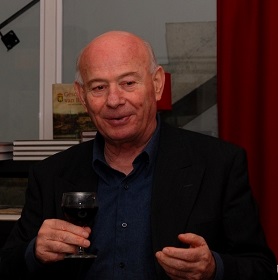
Fatos Kongoli (Elbasan, 12 januari 1944)
De Amerikaanse schrijver Jack London (eig. John Griffith Chaney) werd geboren op 12 januari 1876 in San Francisco, Californië. Zie ook alle tags voor Jack London op dit blog.
Uit: To Build a Fire
“Day had broken cold and grey, exceedingly cold and grey, when the man turned aside from the main Yukon trail and climbed the high earth-bank, where a dim and little travelled trail led eastward through the fat spruce timberland. It was a steep bank, and he paused for breath at the top, excusing the act to himself by looking at his watch. It was nine o’clock. There was no sun nor hint of sun, though there was not a cloud in the sky. It was a clear day, and yet there seemed an intangible pall over the face of things, a subtle gloom that made the day dark, and that was due to the absence of sun. This fact did not worry the man. He was used to the lack of sun. It had been days since he had seen the sun, and he knew that a few more-days must pass before that cheerful orb, due south, would just peep above the sky-line and dip immediately from view.
The man flung a look back along the way he had come. The Yukon lay a mile wide and hidden under three feet of ice. On top of this ice were as many feet of snow. It was all pure white, rolling in gentle, undulations where the ice jams of the freeze-up had formed. North and south, as far as his eye could see, it was unbroken white, save for a dark hairline that curved and twisted from around the spruce-covered island to the south, and that curved and twisted away into the north, where it disappeared behind another spruce-covered island. This dark hair-line was the trail – the main trail – that led south five hundred miles to the Chilcoot Pass, Dyea, and salt water; and that led north seventy miles to Dawson, and still on to the north a thousand miles to Nulato, and finally to St. Michael on Bering Sea, a thousand miles and half a thousand more.
But all this – the mysterious, far-reaching hair-line trail. the absence of sun from the sky, the tremendous cold, and the strangeness and weirdness of it all – made no impression on the man. It was not because he was long used to it. He was a newcomer! in the land, a chechaquo, and this was his first winter. The trouble with him was that he was without imagination. He was quick and alert in the things of life, but only in the things, and not in the significances.“
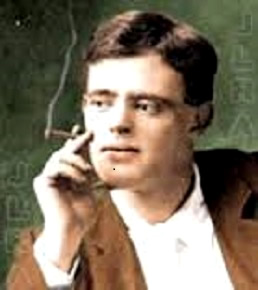
Jack London (12 januari 1876 – 22 november 1916)
De Hongaarse schrijver Ferenc Molnár werd op 12 januari 1878 in een burgerlijk-joods gezin van Duitse afkomst geboren. Zie ook alle tags voor Ferenc Molnár op dit blog.
Uit: Liliom
“JULIE Are you talking to me?
MRS. MUSKAT Yes, you! You – chamber-maid, you! In my carousel – –
JULIE Who did anything in your old carousel? I paid my fare and took my seat and never said a word, except to my friend here.
MARIE No, she never opened her mouth. Liliom came over to her of his own accord.
MRS. MUSKAT It’s all the same. I’m not going to get in trouble with the police, and lose my license on account of you – you shabby kitchen maid!
JULIE Shabby yourself.
MRS. MUSKAT You stay out of my carousel! Letting my barker fool with you! Aren’t you ashamed of yourself?
JULIE What? What did you say?
MRS. MUSKAT I suppose you think I have no eyes in my head. I see everything that goes on in my carousel. During the whole ride she let Liliom fool with her – the shameless hussy!
JULIE He did not fool with me! I don’t let any man fool with me!
MRS. MUSKAT He leaned against you all through the ride!
JULIE He leaned against the panther. He always leans against something, doesn’t he? Everybody leans where he wants. I couldn’t tell him not to lean, if he always leans, could I? But he didn’t lay a hand on me. »
MRS. MUSKAT Oh, didn’t he? And I suppose he didn’t put his hand around your waist, either?
MARIE And if he did? What of it?
MRS. MUSKAT You hold your tongue! No one’s asking you – just you keep out of it.”
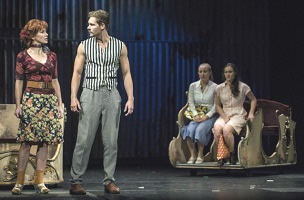
Ferenc Molnár (12 januari 1878 – 1 april 1952)
Scene uit een opvoering in Kecskemét, Hongarije, 2014
Zie voor nog meer schrijvers van de 12e januari ook mijn blog van 12 januari 2015 en ook mijn blog van 12 januari 2014 deel 2.
Zie voor bovenstaande schrijvers ook mijn blog van 12 januari 2007 en ook mijn blog van 12 januari 2008 en eveneens mijn blog van 12 januari 2009.
